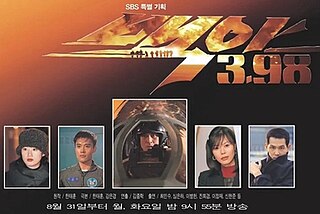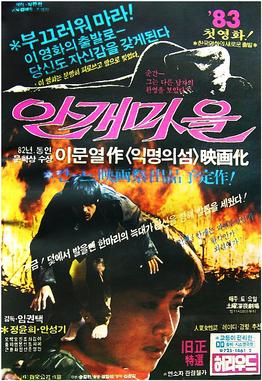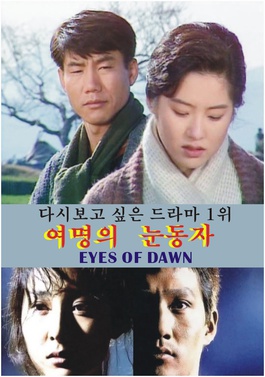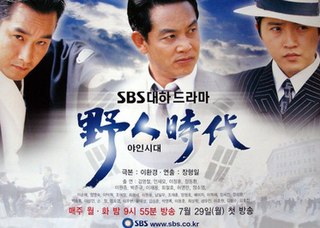
Im Kwon-taek is one of South Korea's most renowned film directors. In an active and prolific career, his films have won many domestic and international film festival awards, as well as considerable box-office success, and helped bring international attention to the Korean film industry. As of spring 2015, he has directed 102 films.
Jang Seung-eop, commonly known by his art name Owon, was a Korean painter of the late Joseon period.

Empress Myeongseong is a 2001 and 2002 South Korean television series that aired on KBS2.

Beyond the Years is a 2007 South Korean drama film. Celebrating director Im Kwon-taek's 100th film, it is based on the short fiction "The Wanderer of Seonhak-dong" by Lee Cheong-jun, and was presented at the 2007 Toronto International Film Festival. Despite being an informal sequel to Im's phenomenally successful Sopyonje (1993), Beyond the Years was not popular with Korean audiences.

The South Korea men's national volleyball team represents South Korea in international volleyball competitions and friendly matches, governed by Korea Volleyball Association. The Republic of Korea (ROK) has competed in the Olympic Games eight times, but has not featured since the 2000 Olympic Games in Sydney, Australia. The national team's best performance at the Olympic Games was 5th place at the 1984 Games in Los Angeles, California, United States. The national team at the FIVB World Championship competed nine times, with their best result at 4th place in 1978. On continental level, The national team won three gold medals at the Asian Games in 1978, 2002 and 2006. And at the Asian Championship, the national team won four gold medals, two of these was at home in 1989 Seoul and 2001 Changwon and the other two are in 1993 and 2003. The national team now ranks 28th in the FIVB World Rankings.

Empress Cheonchu is a 2009 South Korean period television series based on the title character, an actual historical figure and her lifelong struggle to protect the country her ancestors built. The granddaughter of Goryeo Dynasty founder Taejo Wanggeon, the empress ruled as the regent for her son Mokjong, the dynasty's seventh ruler. Determined to realize her ambitious goals for the kingdom of Goryeo, she dons armor, battles against foreign invaders, and tramples her lover, her son and brother in her rise to power.

South Korea participated in the 2006 Asian Games in Doha, Qatar on 1–15 December 2006. South Korea ranked 2nd with 58 gold medals in this edition of the Asiad.

White Nights 3.98 is a 1998 South Korean television series based on the novel of the same title by Han Tae-hoon. It aired on SBS from August 31, 1998 to November 3, 1998.

Make It Big is a 2002 South Korean comedy film. Song Seung-heon, Kim Young-jun and Kwon Sang-woo play three high school students who are startled when a bagful of money and a dead man fall on top of their car. Once they realize just how much money is in the bag, they give up any thought of calling the police.

Village in the Mist or Village of Haze is a 1983 South Korean film directed by Im Kwon-taek.
How to Top My Wife is a 1994 South Korean comedy film directed by Kang Woo-suk, starring Park Joong-hoon and Choi Jin-sil.

Eyes of Dawn is a South Korean television series starring Chae Shi-ra, Park Sang-won and Choi Jae-sung. Directed by Kim Jong-hak and written by Song Ji-na based on the 10-volume novel of the same name by Kim Seong-jong, the story spans the years from the Japanese colonial period to World War II, Korea's liberation and the Korean War.

The Master of Revenge is a 2016 South Korean television series starring Chun Jung-myung, Cho Jae-hyun, Jeong Yu-mi, Lee Sang-yeob and Gong Seung-yeon. It aired on KBS2 from April 27, 2016 to June 30, 2016 on Wednesdays and Thursdays at 21:55 for 20 episodes, replacing Descendants of the Sun.

Rustic Period (Korean: 야인시대) is a South Korean television series aired from July 29, 2002, to September 30, 2003, on SBS. It focused on the life of historical figure Kim Du-han, a former mob leader turned politician, and the tumultuous modern history of Korea from the Japanese occupation to Park Chung-hee regime.

The Dawn of the Empire is a South Korean historical television series which aired on KBS1 from March 2, 2002 to January 26, 2003 for 94 episodes every weekend at 21:45 (KST). It's KBS' second histocal series set in Goryeo after Taejo Wang Geon and revolves around the reigns of the second, third and fourth king of Goryeo, particularly on the latter, Gwangjong's.

Toji, the Land is a 2004 South Korean television series based on the novel Toji ( 토지) written by Park Kyong-ni. The series following the story of turbulent life of Choi Seo-hee as she lives throughout the Donghak Peasant Revolution, the Eulmi Incident, the Japanese colonial era, and Korea's independence in 1945. As in the novel, the drama portrays the conflicts between individuals who are engulfed in their own desires of love and veiled enmity, rage and jealousy. Starring Kim Hyun-joo, Yoo Jun-sang, it premiered on SBS on November 26, 2004, and aired on Friday and Saturday at time-slot 20:45-21:45 (KST) till May 22, 2005.

Park Jung-hoon is a South Korean cinematographer and film director. Park gained international recognition with the action thriller The Villainess, which premiered at the Cannes Film Festival in 2017, with four awards as Director of Photography. Park has been working in the film industry for almost two decades on a variety of genres, including low-budget films, independent films, and documentaries.















